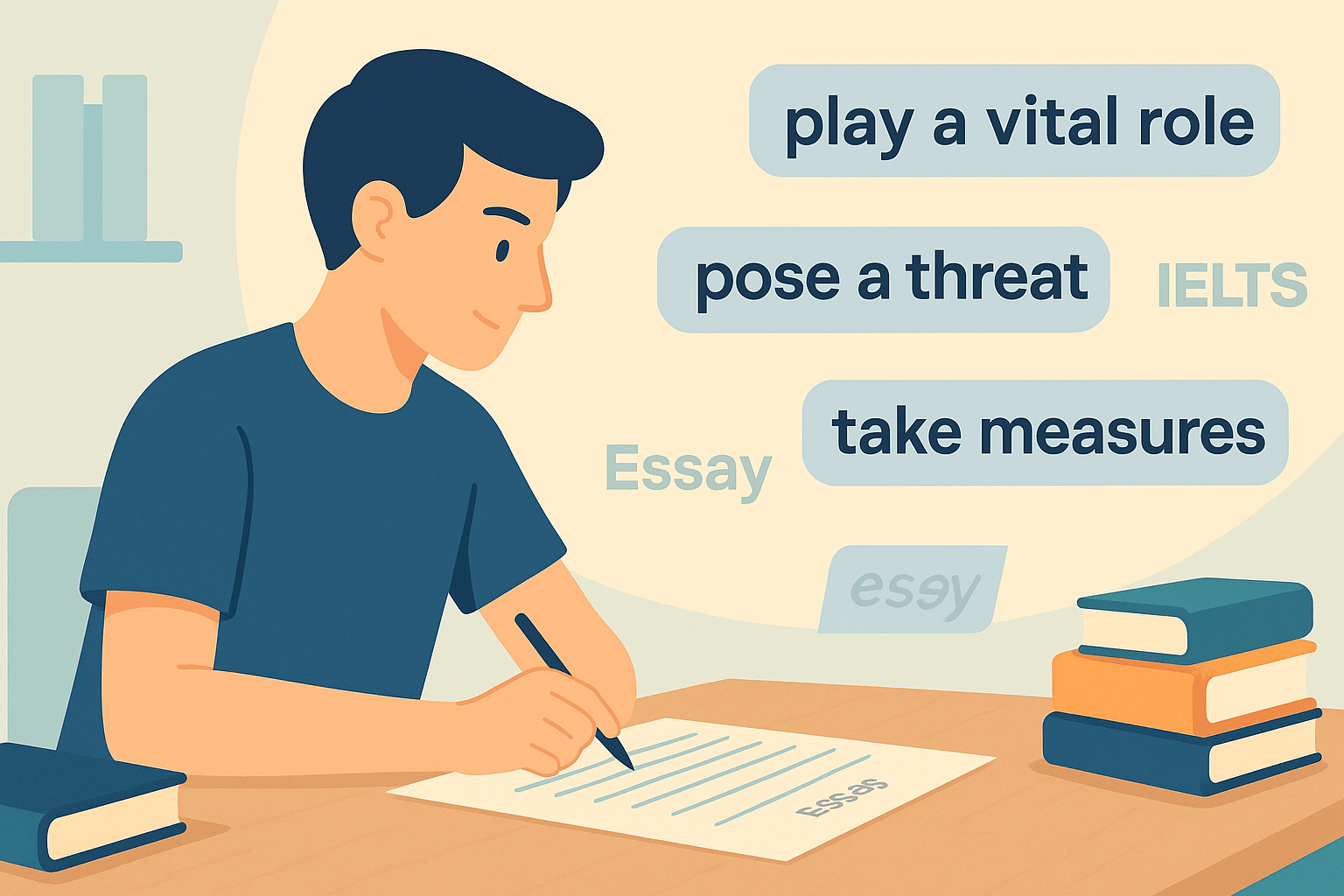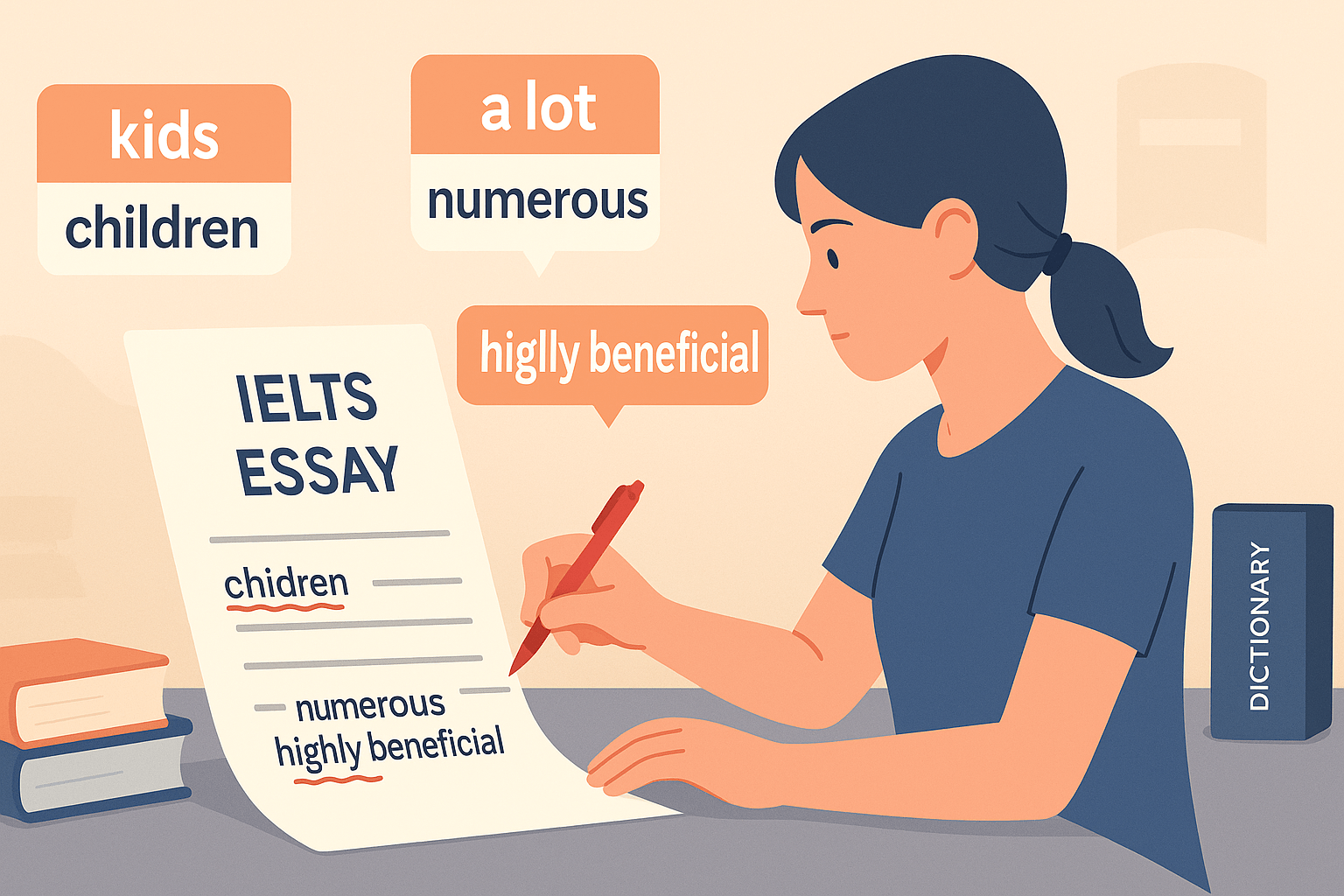When I coach students for IELTS Writing Task 2, one of the most common questions I hear is:
“How can I make my essay sound formal and academic enough for Band 7–9?”
The answer lies in academic phrases and formal expressions. Using the right IELTS Writing Task 2 phrases makes your essay clear, professional, and examiner-friendly.
In this blog, I’ll share:
- ✅ Ready-to-use academic phrases and collocations for all essay sections
- ✅ How to use IELTS academic expressions naturally
- ✅ My top teacher tips to make your writing formal without sounding robotic
Before we start, if you haven’t seen my IELTS Writing Task 2 Vocabulary for Band 7–9, I highly recommend checking it out. It forms the pillar for building your writing vocabulary and phrases.
Why Academic Phrases Matter in IELTS Writing Task 2
The IELTS Writing Task 2 scoring criteria include Lexical Resource and Coherence and Cohesion, which together account for 50% of your score.
- Academic phrases show examiners you can write formally and naturally
- They connect ideas smoothly without overusing basic linking words
- They help you avoid informal language like “I think this is good”
AEO Answer Snippet:
IELTS Writing Task 2 phrases are academic expressions that improve essay formality and coherence, helping candidates achieve Band 7–9.
To learn more about scoring, visit these official resources:
Essential Academic Phrases for IELTS Writing Task 2
Here’s my personal list of ready-to-use academic phrases categorized for each part of your essay.
1. Academic Phrases for Introductions
Start your essay professionally with these formal expressions:
- It is widely accepted that…
- There is no denying that…
- In recent years, … has become a significant concern.
- Many researchers have argued that…
- It is often claimed that…
Example Introduction:
“It is widely accepted that technology has fundamentally changed how people communicate in the modern world.”
2. Academic Phrases for Presenting Opinions
When the essay requires your perspective (agree/disagree or opinion essays), these IELTS Writing Task 2 phrases work well:
- I firmly believe that…
- From my perspective…
- It is my conviction that…
- I am inclined to agree that…
- This essay will argue that…
Example:
“I firmly believe that investing in renewable energy is crucial for sustainable development.”
3. Academic Phrases for Explaining Causes and Effects
Use these when discussing reasons and consequences:
- This can be attributed to…
- One contributing factor is…
- This often leads to…
- As a result… / Consequently…
- This phenomenon can be explained by…
Example:
“The rise in obesity rates can be attributed to sedentary lifestyles and the consumption of processed food.”
4. Academic Phrases for Giving Examples
Examples strengthen your arguments and impress examiners:
- For instance…
- For example…
- This is clearly illustrated by…
- Such as…
- Namely…
Example:
“Many countries invest in renewable energy, for example, solar and wind power.”
5. Academic Phrases for Adding and Contrasting Ideas
To maintain cohesion, use these phrases instead of repeating “and” or “but”:
- Moreover… / Furthermore… (addition)
- On the other hand… (contrast)
- Nevertheless… / Nonetheless… (contrast)
- While it is true that… (balanced contrast)
- Despite this… (contrast)
Example:
“The internet has revolutionized education; however, it also raises concerns about information overload.”
6. Academic Phrases for Conclusions
Finish your essay gracefully with these concluding expressions:
- In conclusion…
- To sum up…
- All things considered…
- Taking everything into account…
- Overall, it can be said that…
Example Conclusion:
“In conclusion, stricter environmental laws and sustainable practices are essential to combat climate change.”
Teacher Tips: How to Use IELTS Academic Expressions Correctly
I’ve reviewed thousands of essays, and here’s what separates Band 7–9 writers from Band 5–6:
1. Use Phrases Naturally
❌ It is widely accepted that good is beneficial. (Awkward)
✅ It is widely accepted that exercise has numerous health benefits. (Natural)
2. Avoid Memorizing Whole Sentences
IELTS examiners can detect memorized templates. Instead, learn flexible phrases and adapt them to the question.
3. Combine with Strong Vocabulary and Linking Words
Academic phrases alone are not enough. Combine them with:
- Topic-specific vocabulary
- High-scoring synonyms
- Cohesive linking words
🔗 Check our IELTS Writing Task 2 Vocabulary for Band 7–9 to boost your lexical range.
Sample Paragraph Using Academic Phrases
“It is widely accepted that environmental protection is a crucial responsibility of governments. This can be attributed to the fact that industrial activities significantly contribute to pollution. For example, urban factories release large amounts of greenhouse gases. Therefore, stricter environmental laws are essential to mitigate the negative impact of human activities on nature.”
Notice how:
- Academic phrases introduce and connect ideas
- The paragraph sounds formal and cohesive
Quick Practice Exercise
Rewrite the following sentence using academic phrases:
“I think social media is bad for students.”
Suggested Answer:
“It can be argued that social media has a detrimental impact on students’ academic performance.”
FAQ Section
Q1: Why should I use academic phrases in IELTS Writing Task 2?
They make your essay formal, cohesive, and examiner-friendly, boosting your Lexical Resource and Coherence scores.
Q2: How many academic phrases should I use in my essay?
Use a few in each section (introduction, body, conclusion). Focus on accuracy and natural use.
Q3: Can I memorize full essay templates for IELTS?
No. Examiners can identify memorized content. Learn flexible phrases instead.
Conclusion
Using academic phrases for IELTS Writing Task 2 is a proven way to make your essays formal and cohesive.
When you:
- Start essays with academic introductions
- Present ideas using formal collocations
- Conclude with professional expressions
… you create the impression of a Band 7–9 writer.
🔗 Next step: Combine these phrases with strong vocabulary from our IELTS Writing Task 2 Vocabulary for Band 7–9 to maximize your writing score.





